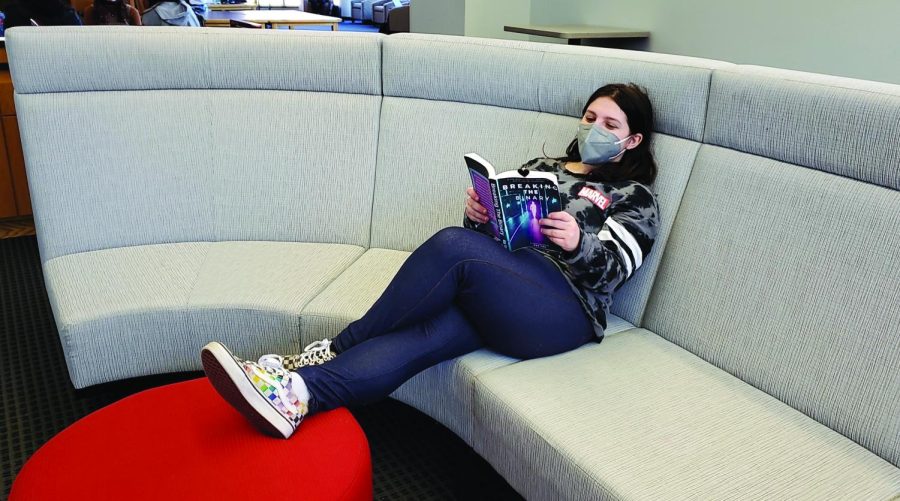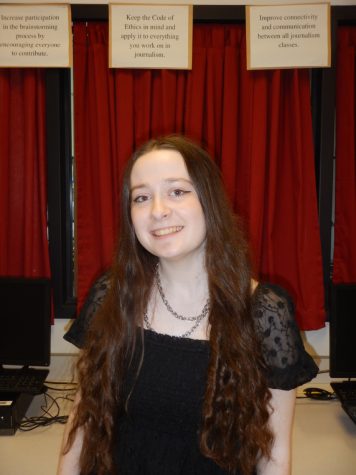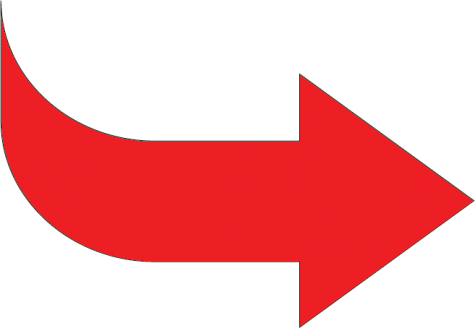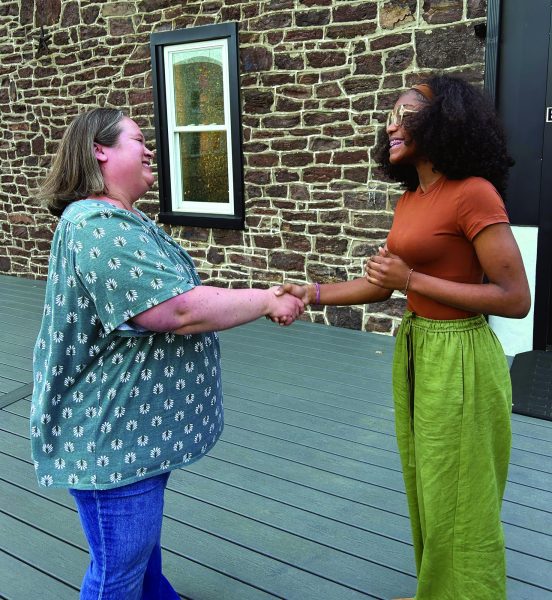Senior ‘breaks the binary’ with first novel
Senior Rachel Gat published her debut novel “Breaking the Binary” under the pseudonym Ray Tag. “Breaking the Binary” can be found at barnesandnoble.com for $16.50 and is newly available on Kindle Direct.
Arrowhead photo by Amanda Hill
Lunch and library…Reading her book, senior Rachel Gat reminisces on what it was like to read the first published copy. Gat read her book during Lunch and Learn held on January 11.
With the help of those closest to her, senior Rachel Gat published her first novel, “Breaking the Binary”, through Barnes and Nobles in hopes to create a legacy.
“Breaking the Binary” is a science fiction novel set in a futuristic society where the main characters find themselves in the simulated world of CyberPunk city. According to Gat, it’s the “world of your dreams” in which you can play video games and “make your own success stories.”
Gat’s book was published on Sept. 26, 2021, but her process started long before then.
“My best friend in fourth grade came up to me and said, ‘Rachel, I’m going to write a novel.’ I thought that was the coolest idea in the world,” Gat said. “I never even considered writing stories or novels before.”
Gat first began the early stages of writing “Breaking the Binary” in her creative writing class taught by English teacher Elise Brand.
Brand felt from early on that Gat’s book would be published. “The class sets up writers to have a novella, or a scaffold of one, to work on further, beyond the course,” Brand said. “Even back then, I could see this project becoming a successfully published story one day.”
Upon finishing the early stages of “Breaking the Binary,” Gat realized there was more potential to her work. “I did write [a book] that was only around 20,000 words called ‘Virtually Connected,’ and that was my first big novel,” Gat said.
As Gat grew older, she felt her writing maturing along with her which she believes was useful in making “Breaking the Binary.” “I feel like I’ve gotten a lot more fluent with my writing,” Gat said. “My writing isn’t as scatterbrained as it once was.”
Gat used reading, consuming content and communicating with others to gather ideas for her book. “I like reading and also just talking with people because everybody has different ideas and personalities,” Gat said. “I think consuming content gives you more inspiration by looking at things you haven’t seen before.”
According to Gat, she never really had a conventional writing process. “I wrote when I felt like it. If I wasn’t in the mood I couldn’t unless I had the inspiration and drive. That’s probably because of my ADHD,” Gat said. “If I wasn’t finding it mentally stimulating enough, I just couldn’t write.”
Once she completed the novel, Gat went searching for a publisher.
Brand gave Gat advice on the publishing process in hopes for it to prove useful.
“Every rejection is disappointing, but keep trying, because one-day a publisher will say yes,” Brand said.
Gat took this advice and tried multiple times to find a publisher. “Eventually, I got so tired out with trying to figure out how to [get a publisher], so I just went to Barnes & Noble Press,” Gat said. “Within a fortnight they had [‘Breaking the Binary’] up on the page.”






